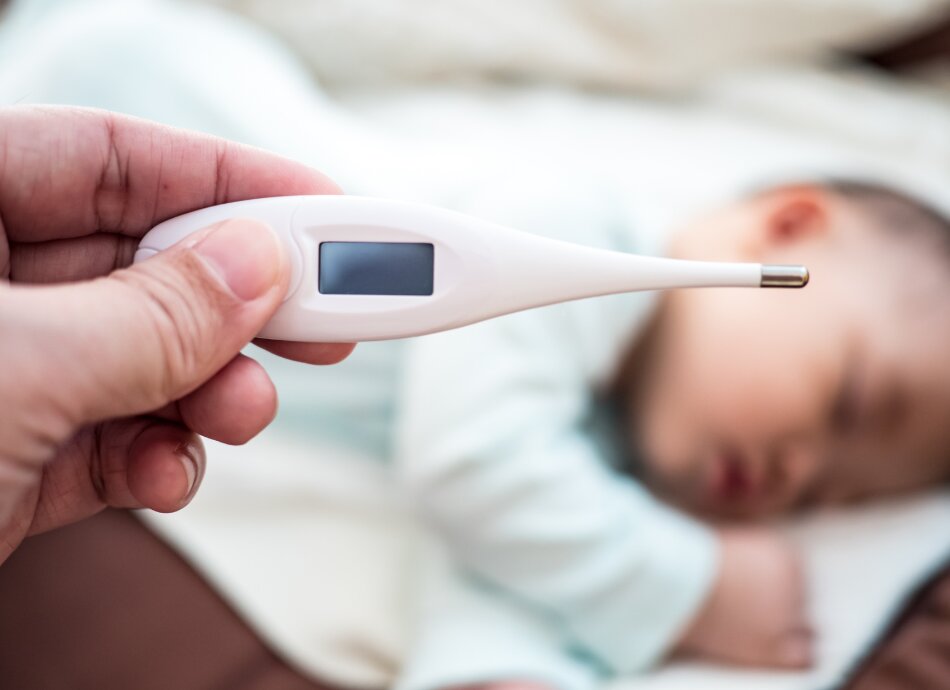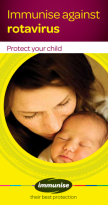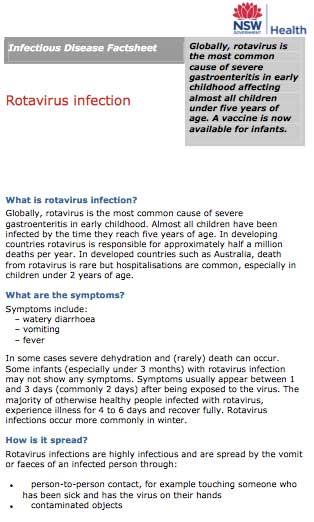Video: Rotavirus
This video may take a few moments to load.
(Immunisation Advisory Centre, NZ, 2017)

Love our website? We do too. Did you know we're a charity? Donate now to help us keep it free for everyone in Aotearoa New Zealand.

This video may take a few moments to load.
(Immunisation Advisory Centre, NZ, 2017)
Rotavirus is spread from someone who has the virus or by contact with the faeces (poo, tūtae) of an infected child or adult. This can happen if you don't wash your hands:
People who have rotavirus infection have a large amount of rotavirus in their poo when they are sick, and for about a week after they feel better. Rotavirus can survive on your hands for at least 4 hours and on surfaces and objects for about 2 months. Without vaccination, almost all children have been infected by the time they reach 5 years old.
Rotavirus disease is most common in infants and young children, but older children and adults can get it too. Rotavirus carries the greatest risk of complications and hospitalisation for children:
If your child has a rotavirus infection, they usually develop a sudden fever, then vomiting and diarrhoea. The illness lasts from 3 to 8 days and includes:
Adults can be infected with rotavirus, but the symptoms are usually mild or they have no symptoms.
Rotavirus is not treated with antibiotics because it is caused by a virus, not a bacteria. The best thing to do if your child has rotavirus is to stop them becoming dehydrated by giving them small amount of fluids often, such as a quarter of a cup every 15 minutes or 1 teaspoon (5 mLs) in a syringe every minute. Keep offering your child fluids even if they are vomiting. Read more about preventing dehydration in babies and children.
Children from 3 months to 2 years are most at risk of severe dehydration. In babies 3 months or younger, the symptoms of rotavirus are usually mild or they have no symptoms. This is possibly due to the developing gut of newborns or the passive protection passed on from their mother’s antibodies during breastfeeding.
| See your doctor immediately if your child |
|
You may find it useful to look at some Baby care apps and Self-management and healthy living apps.
Children with diarrhoea or vomiting should not go to school or daycare until they until they are well and for 48 hours (2 days) after diarrhoea or vomiting has stopped.
Rotavirus is very infectious. It is easily spread by contact with poo from an infected person. To help stop rotavirus spreading, wash your hands thoroughly with soap and water or a hand-sanitising gel.
Vaccination is the best way to protect against rotavirus.
Without vaccination, almost all children will get rotavirus before they are 5 years old. Without vaccination, rotavirus results in:
Vaccination against rotavirus is very effective. It prevents:
Rotavirus vaccine is an oral vaccine that is given as drops that are squirted into your baby’s mouth.
Read more about the rotavirus vaccine.
Immunise against rotavirus(external link) HealthEd, NZ
Rotavirus(external link) Immunisation Advisory Centre, NZ
ROTARIX® consumer information leaflet(external link) Medsafe, NZ
Rotavirus vaccine consumer educational Q&A (external link)Medsafe, NZ
Baby care apps
Self-management and healthy living apps
Rotavirus vaccine(external link) Health New Zealand | Te Whatu Ora
Rotavirus infection – factsheet NSW Multicultural Health Communication Service, Australia. Available in the following languages: English(external link), Arabic(external link), Chinese (traditional)(external link), Farsi(external link), Khmer(external link), Korean(external link), Thai(external link), Vietnamese(external link), more languages(external link)
Quick answers to frequent RotaTeq® questions – fact sheet for vaccinators(external link) 2017
ROTARIX® oral vaccine datasheet(external link) Medsafe

Ministry of Health, NZ, 2017

NSW Multicultural Health Communication Service, Australia
English, Arabic, Chinese (traditional), Farsi, Khmer, Korean, Thai, Vietnamese, More languages
Credits: Healthify editorial team. Healthify is brought to you by Health Navigator Charitable Trust.
Reviewed by: Dr Osman David Mansoor, Medical Officer of Health, Hawke’s Bay DHB; Ministry of Health, Public Health Group
Last reviewed:
Page last updated: